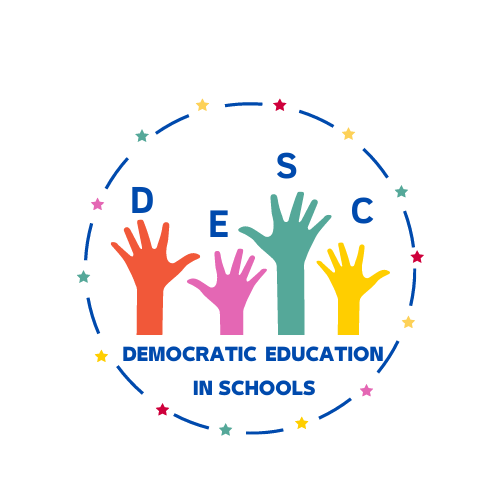DESC brings forward a comprehensive and systemic approach (Whole School Approach) aimed at creating active and responsible citizens able to take up their responsibilities and social commitments, and to fulfil their talents.
DESC’s general objective (GO) is to promote the integration of democratic education methodology into the European education systems as a way of fostering life competences and citizenship competences in schools. The DESC general objective is supported by a number of specific objectives (SOs):
SO1: Promotion of the professionalization of teachers in the field of democratic education, by an innovative cross-country Research Report that will divulge democratic school methodology in Europe.
SO2: Empowerment of teachers in promoting students’ talents, motivation to learn, Life comp & citizenship
competencies through the participation in a Teacher Training on democratic education, and the use of the DESC OER Platform in which they can find resources in a Knowledge Center, and exchange competences in an Agora forum.
SO3: Open up the school to local communities through cooperation with external stakeholders that will be identified through a Community Mapping tool, invited to use the OER Platform and connected to the school through a National Transferability Action Plan.
S04: Foster changes in education policy development, through Policy Recommendations that will generate awareness, scale up and disseminate the use of democratic education methodology at European and National level.
The project starts from the consideration that traditional educational models are scarcely adapted to equip students with 21st century skills. EU reports indicate the necessity of “innovative pedagogical experiences with transversal and subject-based approaches to be envisaged, so that we understand better how to teach LifeComp competences” (JRC, 2020). At the same time, statistics show that schools are generally not suited to help students to be satisfied in their life (OECD, 2017) to be satisfied in their job (Gallup 2013;2017) and to develop a strong sense of belonging in their school community (PISA and the EU report, 2018). In the preparation phase of the project, these considerations have been shared by public schools’ staff interviewed, who expressed the following needs:
Having a teaching training in innovative, learner-centred approaches
Enhancing motivation in learners
Increase students’ sense of belonging and responsibility in the school and towards the local community
To address these needs, DESC aims at promoting the integration of democratic education methodology into the European education systems as a way of fostering life competences and citizenship competences in schools.To do so, DESC proposes a methodology, inspired by democratic education, based on 3 evolutive axes, matching 3 levels of student’s life:
Learner level: promotion of student-centered learning
School level: students’ participation in school management
Community level: school as an open system
Democratic education implies that students become active actors in all these three different levels. On a personal level, by participating in the choice of their curriculum and in the individualization of their talents. On a school level, by participating in the management of the school, stressing the centrality of students’ voices as described in the UN Convention on the Rights of the Child and the importance of fostering citizenship competences (Council Recommendation of 22 May 2018). On a community level, putting learners in contact with different territorial actors and real-life challenges as exhorted by the European Commission Report, Science Education For Responsible Citizenship (2015).
Democratic schools’ experiences have existed since a century in Europe, and dozens of new democratic schools are blossoming every year in the EU. Most of these schools often host students facing barriers in accessing mainstream school systems. However, the phenomenon relies mostly on private and small-scale organizations. More and more, public schools are starting to be interested in this methodology, though until now there has not been a systematic exposure of public schools to his approach. The partnership wants to connect these two realities: democratic schools as the primary source of know- how and public schools that will transfer democratic school methodology into the mainstream education system. This will be done with the support of a partner university and an Advisory Board of academics and world-renowned experts in democratic education.
